Focal area: Research
-
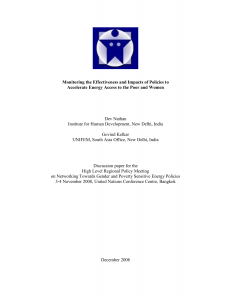
Monitoring the Effectiveness and Impacts of Policies to Accelerate Energy Access to the Poor and Women
The paper develops a framework for monitoring the effectiveness of energy policies with regard to the poor, rural and urban, and women. This framework is based on the axes of Availability, Access, End-use and Impacts. Suitable indicators have been identified for each level of monitoring. With regard to data collection it is suggested that the…
-
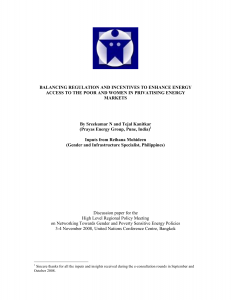
Balancing Regulation and Incentives to Enhance Energy Access to the Poor and Women in Privatising Energy Markets
The objective of this paper is to explore issues related to incentives and regulation in providing energy access to the poor and women. The market oriented reform that began in 1990s, promising the end of all problems of the sector, has by and large bypassed the poor. Many countries have initiated direct programmes to increase…
-
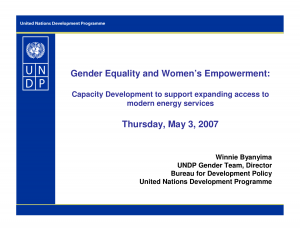
Gender Equality and Women’s Empowerment: Capacity development to support expanding access to modern energy services
The outline of the presentation:(1)Energy and Gender – links and challenges; (2) Gender issues in infrastructure; (3) Scaling up access to modern energy services for poor women and men entails…; (4) Integrating energy into MDG-based National Development Strategies/PRS; (5) Developing Institutional Capacity to deliver energy services; and (6) Partnerships are critical – nobody can do…
-
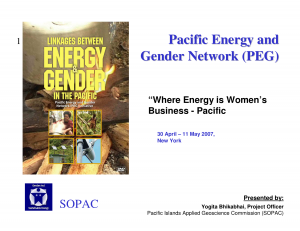
Where Energy is Women’s Business – The Pacific
Outline of the presentation:(1) Energy and gender issues – Pacific; (2) Pacific Energy and Gender Network (PEG); (3)PEG achievements; (4) PEG Strategic Action Plan; (5) PEG Capacity building workshops; and (6) Concluding remarks.
-
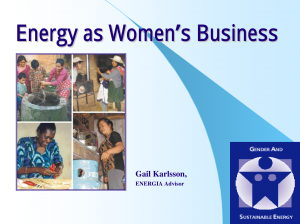
Energy as Women’s Business
This presentation marked the launch of the ENERGIA publication ‘Where Energy is Women’s Business’. The book is a compilation of regional reports and national gender and energy papers, commissioned by ENERGIA in preparation for discussions on access to energy at CSD 14 & 15. By presenting this publication at CSD 15, ENERGIA provided an opportunity…
-
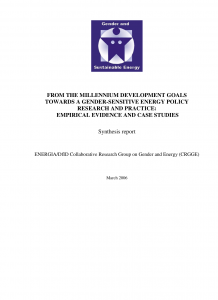
From the Millenium Development Goals towards a gender-sensitive energy policy research and practice: empirical evidence and case studies
This synthesis report presents the results of an ENERGIA/UK Department of International Development (DfID) research project on “Gender as a key variable in energy.” The project brought together some of the world’s foremost experts on gender and energy in a Collaborative Research Group on Gender and Energy. Gender equality and women’s empowerment are viewed as…
-
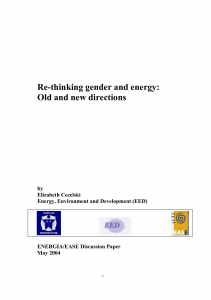
Re-Thinking Gender and Energy: Old and new directions
This paper asks what approaches to policy research could help make the linkages among gender, energy and poverty more understandable and more convincing to policy makers and practitioners, both in the energy sector itself, and in the gender and development community. It attempts a “re-thinking” of the gender and energy paradigm, by looking both backwards…
-
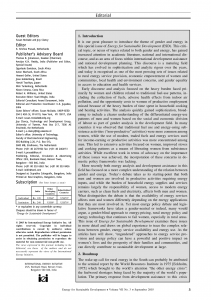
Editorial in special issue Energy for Sustainable Development Journal on Gender and Energy
The articles in this special issue of ‘Energy for Sustainable Development’ show that ‘engendered’ approaches to energy service provision and energy policy can have a powerful and positive impact on women’s lives and the prosperity of their families and communities, and can directly contribute to sustainable development at large.
-
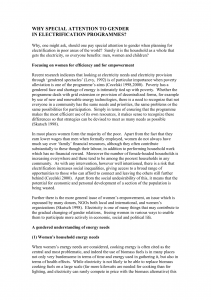
Why Special Attention to Gender in Electrification Programmes?
This paper sets out to say that women’s priority energy needs are different from men’s. There is little information or written experience, however, on how to deal with this in the practice of setting up and running electrification programmes. The report presents four steps that should be taken to take gender differences explicitly into account.
-
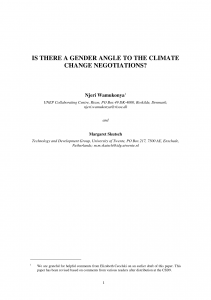
Is There a Gender Angle to the Climate Change Negotiations?
This paper attempts to establish whether gender issues need to be addressed in the climate change debate. Towards this goal, a number of different issues within the climate change debate, in particular the instruments proposed are analysed. While there are many gender angles related to the climate change convention and the instruments therein, some are…

